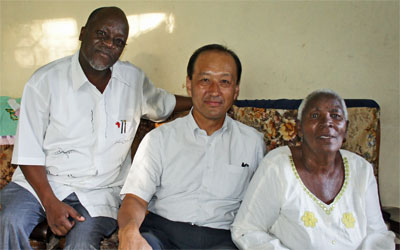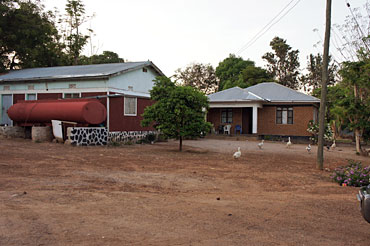- Miscellaneous top
- About Japanese politics
- Upper House Election 2025
- Upper House Election 2022
- From the LDP to the DPJ
- Upper house is needed?
- Nuclear accident at Fukushima
- Japan in March 2011
- Olympic 2020 and COVID-19
- About Japanese society
- Eternal value taker
- Our lost cultural heritage
- Fish consumption in Japan
- Priority seats
- Dangerous bicycles
- Sumo scandal and yakuza
- TV wide show
- About history
- Izumo and Yamato
- Pujie - Last Emperor’s brother
- Himiko in Hashihaka?
- Far Eastern ancient history
- Foreign topics
- Auckland
- Islamabad
- Moscow
- Teheran
- Kabul
- Death of Tanzania's President
Death of Tanzania's 'bulldozer' President Magufuli
It was a great shock for me to hear the news that Tanzania's 'bulldozer' President Magufuli died on 17 March.I spent three and half years in Tanzania and feel till now so much attachment to the country and its people. During my stay I had numerous occasions to meet John Pombe Magufuli, then Minister for Public Works, and was strongly impressed by his ability to execute plans and projects effectively and secure the desired results. He was always considering and working for the betterment of his poor fellow Tanzanians and hated politicians who were working for their own benefit. He lived in a simple way and had very warm, candid and friendly personality. I once visited his home in Chato and was surprised by his and his family's humble life style.
When I left Tanzania, the presidential campaign for the 2015 election had not officially started yet, but people were speculating about the future President. The then foreign minister Membe was a favorite of the then man of power, President Kikwete and was considered to have good prospects for presidency. The former Prime Minister Lowassa was popular among the ordinary people and a powerful rival for Membe. The then Prime Minister Pinda also seemed to have ambition to stand as candidate. Magufuli was not among those strong would-be candidates. The media occasionally mentioned Magufuli, but as a sort of dark horse. Nevertheless, about a half year after I left Tanzania, Magufuli was surprisingly chosen as the presidential candidate of the strong government party CCM and was elected the President of Tanzania.

A snapshot in Magufuli's house in Chato. Together with his mother.
Combat corruption and wasting
Having sworn as President, Magufuli immediately started a campaign to root out corruption. He fired the top officials of Port Authority and Transport Ministry, then purged corrupt officials one after another ruthlessly. Corruption of government officials, in particular police and judiciary, was the daily problem for the Tanzanian people, and this vigorous action was welcome by the public.
He also hated inefficiency and under-performing of officials as well as unnecessary government spending. Therefore, he purged so-called "ghost workers" from the public sector, cancelled the lavish Independence Day ceremony and initiated instead cleaning-up the road outside State House.
Because of his harsh measures, there were Tanzanians who did not appreciate him. Some of my Tanzanian friends even called Magufuli a dictator. I think, they profited from the traditional connections and prospered under the corrupt government. They were unfortunately the target of the Magufuli’s reform policy. I am convinced, their criticism against Magufuli is a good evidence for the righteousness of Magufuli’s policy. though the relations to Zanzibar should be considered separately.

Magufuli's house looks simple. There stand only a few other houses on the ground, including mother's house.
Keep the Tanzanian wealth to Tanzania
Thus, Magufuli without delay started to build an efficiently working and clean government. At the same time, he wanted to protect Tanzania from foreign exploitation. Therefore, he tried to revise or cancel the contracts with foreign companies or governments which did not serve the interests of Tanzania.
Barrick Gold Co., for example, is managing all important gold mines in Tanzania. However, the Canada based company was suspected not to pay sufficient taxes and royalties. Magufuli succeeded in drastically changing the relations to the company, so that Tanzania could better participate in the benefit derived from the export of its precious natural resources.
Another issue is China. China's role in Tanzania is dichotomic. China’s goods, construction services and project financing are indispensable in Tanzania, because Tanzania as poorest country cannot afford good-quality but expensive products or infrastructure. No Western developed country is ready to give credit to a poor country such as Tanzania for its badly needed projects. Only China can fulfill the needs of Tanzania.
On the other hand, Tanzania was terribly troubled by the low-quality of Chinese products and China-made infrastructure as well as the greedy lending policy of China and the mounting debt to China. Unfortunately, some politicians were tamed by the benefit deriving from their relations with China and they damaged the national interests of Tanzania.
Therefore, it was a matter of course that Magufuli cancelled the contracts concluded by his predecessor to entrust China with the building of a huge port in Bagamoyo. Magufuli said "the former president negotiated the project poorly and started the project on conditions that were equivalent to selling Tanzania to China". (One response to "Falling Apart ? A story of the Tanzanian Bagamoyo Port project" September 16, 2020)
There were many alternative ideas for the revitalization of the Central Railway. I believe, it was the best choice to give license to a Danish company to build a new standard-gauge railway between Dar es salaam and Morogoro using the money from World Bank.
The way to self-determination and autonomous development?
Magufuli, like many other political and intellectual leaders in Tanzania, wanted to decide the future of his country by the Tanzanians themselves. Good advices from foreign friends are welcome, but they should not be dictated. Advices neglecting the reality of Tanzania should be rejected. Many seemingly good advices from developed partners might entail some profit considerations under the surface, therefore they should be carefully examined. Even though advices come from genuine goodwill, they might not be applicable to his country, because the way of thinking behind the idea and the proposed policy measures might reflect the reality of developed countries and not of Tanzania.
The biggest hindrance for realizing peaceful and happy life for African people is the lack of national identity. Due to unfortunate colonial history, civil wars do not cease to exist in most African countries. Fortunately, Tanzania had a genial "Father of the Nation", Mwalimu Nyerere. Thanks to his wisdom, from about 140 tribes in Tanzania, the feeling of "being a Tanzania national" was gradually emerging and since its independence in 1961 there has been no civil war.
However, the intervention from outside continued, both with humanitarian motivation and with realistic political and business needs.
We should not forget that even humanitarian assistance to help poor people eventually hinders the development of an independent and sustainable society. When I arrived in Tanzania, I was surprised to know there were hundreds of NPOs in Tanzania, which for example claim to help poor children or mothers in Tanzania. They implement projects funded by charity organizations in developed countries.
Many smart graduates from universities do not want to work in the public service or industrial sector, but tend to establish their NPOs so that they can administer money from developed countries and live comfortable lives like their partners in developed countries.
Thanks to the goodwill of the people in developed countries, government officials have learned how to write beautiful reports to the donors. Some of them came to be able to form nice project papers which appeal to the donors, both public and private. But, generally speaking, they are not in a position to execute projects. Many of them do not see what is really needed for their country and people, because that kind of capability is not appreciated by foreign donors. They are expected to do what the donors want.
What is badly needed in Tanzania for its future is to have
- a clear idea how to develop their country
- an efficient and clean government machinery to implement the idea
- a good teamwork among officials according to the rolls allotted to them.
Corona skepticism?
I think Magufuli’s attitude to Corona epidemy should be interpreted in the context I mentioned above. Some Tanzanian friends coldly described the fuss over Corona in the developed countries.
Dangerous epidemy is not limited to Corona. There are many others such as malaria and Ebola. They keep attacking the poor African developing countries. Even before Corona, Tanzanians were the victims of malaria: "Each year, 10 to 12 million people contract malaria in Tanzania and 80,000 die from the disease, most of them children." (Malaria Spot) Fortunately, the number of malaria patients and deaths has been decreasing recently thanks to efforts such as distributing special mosquito nets.
While epidemic victims were limited to developing countries, developed countries did not pay much attention. Only when Coronavirus started to hit developed countries, they began making an uproar and berating developing countries to handle the pandemic in the same manner as in developed countries.
However, social conditions in poor countries are totally different from those in developed countries. There is an absolute shortage of medical resources: not enough doctors, not enough nurses, not enough hospitals, not enough medicine and so on. Even masks are not available, there is no mask production facility and no money to buy enough masks from abroad for everyday use of 56 million Tanzanians.
What results would come up, if social and economic restrictions similar to those in developed countries were introduced into poorest countries? Should they once again heavily depend on the goodwill and assistance from developed countries, even though the effect of the developed countries' recipe is questionable in developing countries?
Fortunately, while malaria victims are mostly children, Corona victims are mostly senior people older than 65. This population segment represents only 2.95% of the Tanzanian population in 2013, while the figure was 30.1% in 2020 in Japan. Therefore, there is a reason to believe that the possible number of Corona deaths would not be unbearable for Tanzania, compared with the damage to its people in case of tightening social and economic activities and the adverse effect of allowing too much dependency on the foreign assistance.
Taking all such factors into consideration, President had no other choice than to just laugh off the risk of COVID-19, I presume. I do not believe that Magufuli did not see the danger of Corona virus. He was a chemist and mathematician. I discovered his excellent understanding of engineering as well as medicine, when I was involved in the construction of gynecology ward in a hospital of his home town Chato.



In closing, I would like to extend my sincerest condolences to the Tanzanian people and hope that his successor, Samia Suluhu Hassan, the first female President of Tanzania, will further the policy initiated by the late President Magufuli.